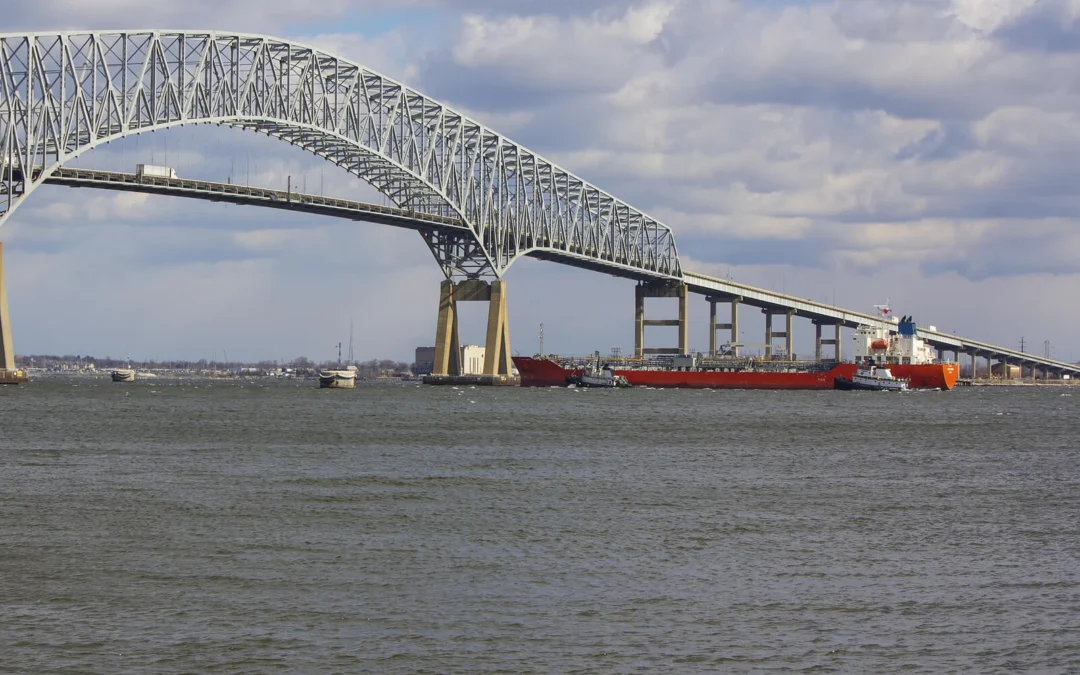In the past few weeks, there was a collision between a cargo ship and the Francis Scott Key Bridge. The boat lost power steering leading to several individuals injured and 6 others dead. The collision was a traumatic incident for all involved, and it can trigger feelings of anxiety and trauma in those who witnessed it or were affected by it. Or for those who have experienced similar incidents in the past.
Some people may not understand why they are feeling anxious or experiencing symptoms of trauma. However, disasters, natural or otherwise, can be a trigger for past traumas and anxieties. It’s out of anyone’s control and can happen at any time, making it all the more difficult to cope with. So, how can an accident like this trigger such intense emotions and reactions? Why is it important to address these emotions and seek support and understanding during this time? Let’s explore these questions further.
What Happened During the Francis Scott Key Bridge Collison?
The Francis Scott Key Bridge collision occurred when a cargo ship struck the bridge and caused major damage to the bridge. Making part of it collapse. The cause of the collision was due to a mechanical failure on the cargo ship, which resulted in it losing power steering and crashing into the bridge. The impact of the collision was traumatic as the bridge is now out of commission, and there were several injuries and fatalities. For families of the workers who were injured or lost their lives, and for those who witnessed the collision, it was a terrifying and traumatic experience.
This kind of trauma can have lasting effects on individuals. For instance, the families of the workers involved may experience prolonged grief and have to cope with the loss of their loved ones. The individuals who watched the bridge collapse when it happened could be experiencing symptoms of post-traumatic stress disorder (PTSD), such as nightmares, flashbacks, or intense anxiety when near bridges or ships. For those who have experienced similar incidents in the past, this collision can serve as a trigger for their past traumas and anxieties.
The Impact of Traumatic Events
Traumatic events, like the Francis Scott Key Bridge collision, can leave a lasting impact on individuals. Disasters like this remind individuals of their lack of control over their lives and the unpredictable nature of events. The suddenness of these incidents can be shocking and overwhelming, causing individuals to experience a range of emotions such as fear, helplessness, sadness, and anger. More than likely, they desire to reclaim their sense of safety and normalcy.
However, that is hard to do when the focus is on events like the collision with the bridge and it is all over the media. For instance, if you have been in a boat accident, had a near-drowning experience, or even experienced vertigo from heights, it can all come back to the surface when an event like this happens. This can trigger intense emotions and physical symptoms such as increased heart rate, sweating, and difficulty breathing. It can trigger a sense of inescapability and trigger a further sense of panic.
Challenges in Regaining Safety and Security
Besides this tragedy, when you see other events in the news, such as war, natural disasters, and acts of violence, it can continually remind you of your feeling of lack of control. No one likes to feel as if they have a lack of control, especially when it comes to their own safety. Seeing these events can trigger past traumas and anxieties and make individuals feel unsafe even in situations where they are not in danger.
What happens when events like the Francis Scott Key Bridge collision make you feel unsafe and anxious? It can be challenging to feel safe in your own mind and body, even if there is no immediate danger present. This can lead to avoidance behavior, where individuals avoid situations or activities that remind them of their traumatic experiences. For example, someone who has experienced a boat accident may become fearful of taking any type of boat or even crossing a bridge. This avoidance can limit individuals’ daily activities and cause further distress.
How Does This Affect You Emotionally?

You can experience a sense of dread, lack of control, fear of something bad happening, or even have difficulty enjoying things you used to love. These are all common reactions to trauma and anxiety triggered by such events, and they can impact your daily life significantly. This can lead to you becoming hyperfocused on controlling your life and aspects of it so that you can feel safe and secure. However, this focus can also become detrimental to your well-being, causing more anxiety and stress.
What Can You Do to Cope with this Trauma?
The first step to coping with trauma is acknowledging the impact it has on you and seeking support. This could be from a friend, a support group, or trauma treatment in Fort Worth, TX, or wherever you may live. Other coping mechanisms can include:
Practicing Box or Belly Breathing Techniques
One way to cope with your trauma is by practicing deep breathing techniques, such as Box or Belly breathing. It works by calming your nervous system enough that your body and mind can be on the same page. To do this, you breathe in for four counts, hold that breath for four seconds, and then release it over another four seconds. This can help alleviate any immediate anxiety and make it easier to cope with your emotions. For example, if you are experiencing an increased amount of anxiety about the Francis Scott Key Bridge collision, you can practice deep breathing before crossing a bridge or while watching news coverage of the event.
Utilizing Mindfulness Techniques
Mindfulness is the practice of being present at the moment and acknowledging your thoughts and feelings without judgment. In moments of anxiety, it can be helpful to take a step back and focus on your surroundings, using your senses to ground yourself in the present moment. This can help you recognize that while you may be experiencing fear or anxiety from past traumas, you are safe in the present moment.
Find Control Where You Can
In the midst of what can feel like a chaotic world, it’s important to remind yourself, “Focus on what is within your power to change, and release the grip on what is not.” This saying highlights the importance of recognizing our limitations in controlling external events. But it also emphasizes how you can control your reactions. By concentrating on areas of your life where you can make changes, such as your habits, routines, perspectives, and whom you choose to seek support from. You will not only regain a sense of control but also a sense of empowerment to live a more fulfilling and resilient life.
How Can Trauma Therapy Help?

For instance, you can learn tools for coping with your anxiety after the collision on the Francis Scott Key Bridge. Additionally, you can work through any avoidance behaviors that may be limiting your daily activities. Trauma therapy can also help you develop a deeper understanding of how trauma has impacted your life and ways to move forward from it.
Tips to Help Deal with Trauma Right Now
If you’re looking for immediate ways to cope with the feelings of anxiety and fear that can come from trauma, here are three actionable tips you might find helpful:
Begin a Journal to Capture Your Thoughts
Writing down your thoughts and feelings can be a form of emotional release, helping you to process what you’re going through. A journal can serve as a safe space where you can express yourself freely, explore your emotions, and reflect on your experiences without fear of judgment.
Practice Deep Breathing
Deep breathing exercises, such as the Box Breathing technique mentioned earlier, can be incredibly effective in managing immediate feelings of anxiety and fear. By focusing on your breath, you create a distraction for your mind, allowing your body to relax and lowering your overall stress levels.
Put Up a Saying to Remind You of What You Have Control Over
Sometimes, a simple reminder in a visible place can help you regain a sense of perspective and control. Choose a saying or affirmation that resonates with you, such as “Focus on what is within your power to change, and release the grip on what is not.” Place it somewhere you will see it regularly to remind yourself of the strength you have to manage your reaction to the world around you.
Traumatic events, such as the collision on the Francis Scott Key Bridge, can have a lasting impact on your life. It’s essential to acknowledge and seek support for the trauma you experience and learn healthy coping mechanisms to help you move forward. You are not alone in this journey, and there is always help available. Remember to be kind to yourself and prioritize your well-being as you navigate through the effects of trauma. You deserve it. So take a deep breath, reach out for support, and know that healing is possible.
Focus on What You Can Control with Trauma Treatment in Fort Worth, TX
Trauma can feel overwhelming and all-consuming, but by focusing on what you have control over, seeking support from a trauma therapist in Fort Worth, TX, or loved ones, and utilizing coping mechanisms like deep breathing and mindfulness. You can take steps towards healing and managing your trauma. Trauma therapy and a trauma-informed approach can provide you with the tools and support you need to navigate through your trauma and regain control of your life. At Anew Counseling DFW, we specialize in providing trauma therapy and support for individuals in Fort Worth, TX, and the surrounding areas. No matter if the trauma has evolved to sex and porn addiction, substance abuse, or any other unhealthy behaviors. Our specialized therapists in Fort Worth, TX are here to support you on your journey towards healing and growth. Take the first step today:
- Fill out our intake form and schedule your free 15-minute consultation.
- Learn More About Us and Our Services.
- Control what you can and let go of what you can’t – your healing journey starts today!
Other Therapy Services Offered by Anew Counseling DFW
Natural disasters and the trauma that can result from them are not the only experiences that may require therapy and support. At Anew Counseling DFW we understand that every individual’s journey is unique and may require different forms of support. That’s why we offer a variety of therapy services tailored to meet your specific needs. At our Fort Worth, TX-based therapy practice we offer a wide range of therapy services to support you in learning how to cope with traumatic experiences and take steps towards a healthier, more fulfilling life. Some of our other therapy services include Sex Addiction Recovery, Trauma Therapy, Anxiety Therapy, Depression Therapy, and Couples Therapy. Our team of experienced therapists in Fort Worth, TX is dedicated to helping you learn what you can control and how to manage areas of your life that feel out of control. We are here to support you every step of the way.

Recent Comments